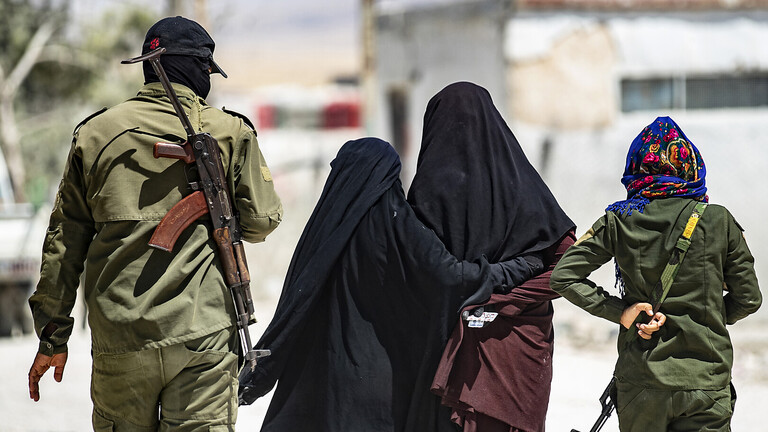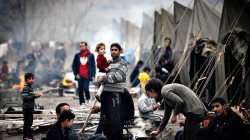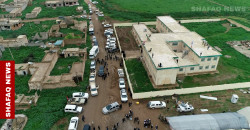Yazidi survivors challenge ISIS leader's family claims of 'Well' treatment

Shafaq News/ Yazidi survivors who were held as "slaves" by ISIS leader Abu Bakr al-Baghdadi have come forward, rejecting allegations made by al-Baghdadi's daughter and wives regarding their "well" treatment during captivity.
In a two-part interview, Yazidi women shared their experiences recounting the "harsh treatment, torture, and rape" they endured while held captive by ISIS.
Adiba Murad, one of the survivors, revealed details of her abduction while pregnant and the "brutal treatment" she faced at the hands of ISIS members.
Another survivor, Rouseta Haji, spoke about the reasons for her "capture, her torture, and the traumatic experiences she faced, including rape during her childhood."
Haji pointed out the "violence and mistreatment inflicted by ISIS women on the captives, including threats of murder and confinement in insect-infested rooms."
Furthermore, Sarab Issa, another Yazidi survivor, disclosed the use of social media apps like WhatsApp by ISIS members to "trade slaves" among themselves, describing it as "an e-market for trafficking."
In the first part of the series, testimonies from some of Al-Baghdadi's captives, known as "sabaya," Yazidi women enslaved by ISIS, also called painful details of their ordeals at the hands of al-Baghdadi himself and his wife.
Nour, daughter of ISIS commander Abu Abdullah al-Zubayr, disclosed that she was married to al-Baghdadi at the age of 14, indicating that the marriage was sanctioned before his infamous speech in Mosul.
Nour revealed that al-Baghdadi married her on the same day as his landmark sermon in Mosul, indicating that she lived alongside his nine other wives and captives in the same residence.
"I was forced to stay with him when the wanted persons list was released," she said.
When asked how he spends his day at home, she said he rarely left his room, where he spends most of the day.
"He communicates with his wives only at night," she said. "Phones were forbidden."
Nour said that al-Baghdadi's Syrian and Chechen wives shared a troubled relationship. He opted to separate them into different households later, according to her account.
Al-Baghdadi's family did not receive any personal protection during their movement from Iraq to Syria and then to Turkiye, she added.
Echoing previous accounts, Nour reiterated attempts by her and al-Baghdadi's first wife, Asmaa, to escape to Turkiye before al-Baghdadi demanded the return of his Syrian and Chechen wives to Syria, while Nour and Asmaa, both Iraqi nationals, remained in Turkiye.
The scale of multiple marriages among the leadership of the organization led Nour to dub the self-styled Islamic State a "state of marriages."
In the first part of Al-Arabiya series, Al-Baghdadi's first wife, Asmaa Mohammed, told the channel that Al-Baghdadi and other leaders of the group were "obsessed" with women.
Asmaa, who married al-Baghdadi in 1999, said that he owned over 10 Yazidi women as "slaves," adding that al-Baghdadi had also, at one point, married a 13-year-old girl.
After ISIS gained control over vast territories in Syria and Iraq, al-Baghdadi became increasingly "arrogant," harboring expectations of international recognition, according to Asmaa, who added that he held aspirations for his group to extend its control into Europe.
"Foreign women played a major role in attracting fighters," she said.
She described him as an "ordinary individual without any extremist inclinations." However, Asmaa claimed that everything changed after al-Baghdadi was apprehended by US forces in 2004 "for no reason."
According to her, his ideology underwent a profound transformation during his one-year incarceration.
Asmaa expressed that al-Baghdadi placed significant importance on his personal safety, prioritizing it above all else. She said that she never witnessed al-Baghdadi directly participating in any combat activities.
In Raqqa, formerly the de facto Syria capital of ISIS, Asmaa identified Mansour, a 23-year-old man, as al-Baghdadi's closest associate. She said al-Baghdadi arranged the marriage of his 12-year-old daughter, Umaimah, to Mansour.
In October 2019, Washington announced that US troops had killed al-Baghdadi in an operation in northwestern Syria, around five years after he proclaimed an Islamic "caliphate" which he and his fighters ruled with brutality across much of Iraq and neighboring Syria.
ISIS was territorially defeated in Iraq in 2017 and two years later in Syria. But, remnants of the group continue to attack civilians and security forces in both countries.





